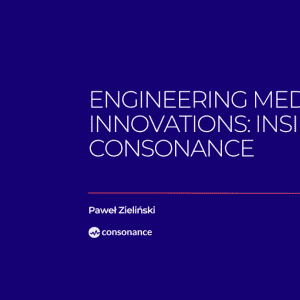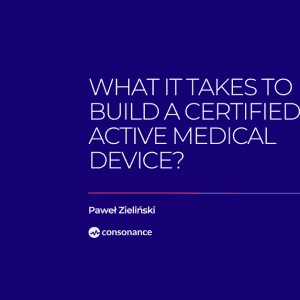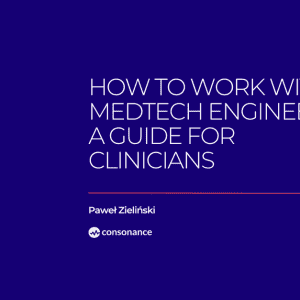The difference between medical device certification and QMS certification

In the Medtech world medical device certification should stay on the entrepreneurial top of mind list to look after. What is the CE and Quality Management System (QMS) all about and how they affect medical device certification? Is certification of the system according to EN ISO 13485:2016 necessary during the certification of a medical device according to MDR? Is the CE certificate not enough?
In this article, I will try to answer these and other questions.
Table of Contents
What is CE mark?
CE marking definition tells that it is a symbol placed on the label of the device, its packaging, and the instructions for use, which is a clear declaration of the manufacturer that his product meets all the requirements of the relevant EU legislation. To obtain such a symbol, it is necessary to undergo a conformity assessment procedure confirming the fulfillment of these EU directives and regulations. It means you need medical device regulatory services.
What is QMS – Quality Management System?
Using commonly available definitions, we can say that Quality Management System is a set of interrelated processes, procedures, instructions, tools, and resources in the form of people or infrastructure, which are to ensure the quality and safety of the product, as well as the repeatability of what we do. Simplifying the above sentence, it can be said that QMS is a tool that is to be used in confirming the compliance of our product with the requirements and obtaining the CE marking.
Medical device certification in practice
Let’s take the medical device manufacturing as an example. If you are a manufacturer, you are responsible for the safety of the product and you must ensure that the device you place on the market will meet its intended use and, most importantly, will not harm anyone or worsen anyone’s health. You don’t do the production entirely on your own. You need a number of employees, equipment, space, full infrastructure or reliable subcontractors you put full trust in.
In the next steps, employees order components, collect and control deliveries, use the components gradually at various stages of the manufacturing process, test the device, pack and release, and finally distribution begins.
Quality management system in medical devices accompanies project participants from the beginning – we register purchases, we know the suppliers because they have been selected on the basis of established criteria, and we have prepared test procedures that every employee knows. When there is a problem, we can react quickly. We can identify the exact component which caused the problem and select those products which may be using the defective component.
The system is not only about manufacturing but about everything we do every day. The way in which we recruit employees, we ensure that their competencies will be appropriate to perform tasks. We maintain and store documents, and we communicate with the client. With quality management system we minimise the risk and increase the chance of detecting problems.
What does Medical Device Regulation say about QMS?
According to article 10 of the Medical Device Regulation, medical devices manufacturers shall establish, document, implement, maintain, keep up to date and continually improve a Quality Management System that shall ensure compliance with this Regulation in the most effective manner and in a manner that is proportionate to the risk class and the type of device.
In another section of the Regulation, we can find information that the implementation of a QMS shall ensure compliance with this regulation.
Moreover, one of the conformity assessment paths described in the MDR is based on full quality assurance. This is the path chosen most often by producers. If the regulation imposes an obligation on manufacturers to establish and maintain a Quality Management System, it is worth using it to the maximum in the process of obtaining the CE mark.
So now we are clear – to obtain the CE marking for our device, it is necessary to implement, maintain and improve the Quality Management System because it ensures compliance with the requirements for medical devices described in Regulation 2017/745.
There is only one thing left to be clarified – apart from the implementation, maintenance and improvement of the Quality Management System, we lack one keyword, i.e. CERTIFICATION. Involuntarily the question arises – does this mean that as a manufacturer I am not obligated to undergo a certification process for QMS?
Is ISO 13485 certification obligatory?
The answer to this question may be surprising – MDR does not impose an obligation to obtain a Quality Management System certificate. ISO 13485 can be an action by the way. However, in all our experience in the MedTech industry, we have not yet encountered a case in which manufacturers of medical devices of classes higher than class I, in the assessment of which a notified body is involved, would not apply for the ISO 13485 certificate. Well, it is a convenient soultion to build trust as a design, engineering or manufacturing company.
Why is this happening? During the conformity assessment procedure, the notified body checks the documentation of the QMS, which we are obliged to implement and maintain, and which confirms compliance with the requirements of the Regulation. Obtaining the ISO 13485 certificate can be treated as an “action by the way” that brings a number of benefits. Below is a list of a few that are worth highlighting:
- lower operating costs: ISO 13485 helps in continuous improvement of processes and increasing their efficiency over time, thus saving the organisation’s money;
- increased customer satisfaction: The Quality Management System helps to ensure a more consistent quality of products and services, thus also reducing the number of complaints from customers, which translates into their satisfaction;
- improvement of the business reputation, and thus better access to the domestic and foreign market: the ISO 13485 certificate is recognized all over the world as a sign of a reputable company and high quality;
- the possibility of getting more customers: many contractors pay attention to cooperation with organisations that have the appropriate certificates, and some even require it.
Fact about Quality Management System (QMS)
We analyze problems, issues about QMS which bother clients to answer better and faster to requirements. The ISO 13485 Quality Management System is not only intended for manufacturers of medical devices. The system can be useful also for distributors, subcontractors, importers and all other bodies operating in the MedTech area looking for improvement opportunities.
A frequently asked question concerns the need to base the system on the EN ISO 13485:2016 standard, or whether another standard, such as ISO 9001, is not enough. The ISO 13485 standard is dedicated to medical devices. ISO 9001 does not contain information on clinical evaluation or handling of sterile devices. Moreover, ISO 13485 is a standard harmonised with MDR, which means that on its basis it is possible to prove the fulfilment of its requirements. Just as the biocompatibility of medical devices is assessed based on the series of ISO 10993 standards, or we check the electrical safety of medical devices using standards from the 60601 family, the QMS for medical devices should be compliant with the ISO 13485 standard.
It is worth emphasising one issue here – the application of any standard is not obligatory according to MDR. However, it is the easiest way to demonstrate compliance with the specific requirements of the regulation. If we decide not to use the available standards, it should be justified.
Finally, it is worth discussing the issue of QMS for manufacturers of class I medical devices who carry out conformity assessment on their own without the participation of a notified body. The most important thing is that the requirements of the regulation apply to them in the same way as manufacturers of class IIa, IIb or class III medical devices. So they should implement and maintain a management system. In practice, they often limit the scope of QMS to a few of the most important procedures, such as post-market surveillance, risk management or medical incident management. However, it is worth remembering that for manufacturers of class I medical devices, the ISO 13485 certificate is the only document that confirms the manufacturer’s commitment to the quality and safety of a medical device, which is issued by an external body, and not as a declaration of conformity by itself.
Summary
Manufacturers are required to implement and maintain a Quality Management System in their organisations. Moreover, there is no obligation to obtain an ISO 13485 certificate. However, it is a normal procedure in the case of medical device certification, because nothing confirms compliance with a standard as well as the assessment of an independent body such as a notified body.
QMS brings a number of benefits and ensures that the essential requirements described by MDR are met.






